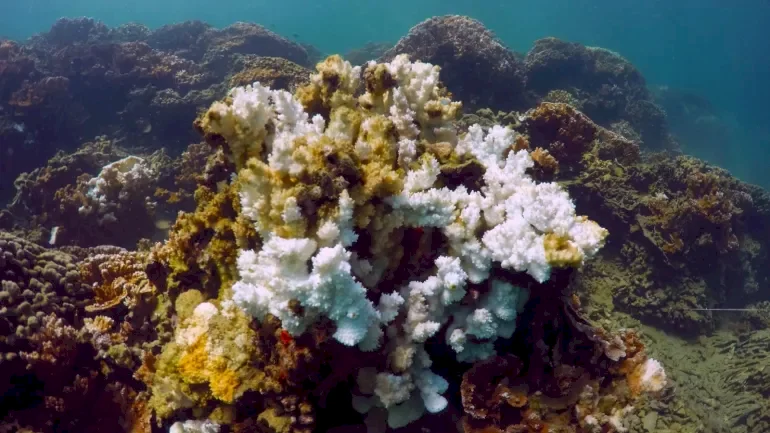
Study: Coral Reefs Will Not Survive Global Temperature Rise
SadaNews - A new study has found that the ongoing rise in global temperatures will lead to a halt in the growth of almost all coral reefs in the Atlantic Ocean, which may face erosion by the end of the century, marking a dangerous climate tipping point.
The study, published in the journal "Nature," analyzed over 400 coral reefs across the Atlantic Ocean and found that more than 70% of the reefs in the region will begin to die by 2040 even under optimistic global warming scenarios.
According to the study, if global temperatures exceed two degrees Celsius above pre-industrial levels by the end of the century, 99% of the coral reefs in the region will face this fate. Currently, global temperatures have risen by about 1.3 degrees Celsius above pre-industrial levels.
Coral reefs are the foundation of marine ecosystems, providing habitat for thousands of fish species and other marine organisms, while also forming barriers that break waves and help protect coastlines from rising sea levels.
A quarter of marine organisms depend on coral reefs, and over a billion people around the world benefit from them, according to the U.S. National Oceanic and Atmospheric Administration.
To predict how corals will perform under future conditions, scientists studied corals that have grown for over 10,000 years across the Caribbean, including those in the Florida Keys, Barbados, and Costa Rica.
Over thousands of years, corals, which require shallow waters with access to sunlight to thrive, have grown vertically to keep pace with rising sea levels, generally maintaining a close relationship between coral growth and sea level rise.
The Danger of Warming
Alice Webb, a coral reef ecologist at the University of Exeter and one of the authors of the study, indicates that understanding the historical balance between growth and erosion is crucial for predicting how coral reefs may change in the future.
As climate change progresses at an accelerated pace, corals struggle to adapt, and the relationship between coral growth and rising sea levels has become "fundamentally broken," said Dr. Chris Perry, a coral reef geologist at the University of Exeter and the lead author of the study.
In the Caribbean, corals have been severely affected in recent years by extreme thermal stress and disease outbreaks, which could worsen with rising temperatures.
Dr. Perry confirmed that about 60% of the corals studied near Florida, and about 40% of those near Mexico, "have completely stopped growing," emphasizing that "an enormous rise in temperatures has occurred, unlike anything the region has seen before."
According to the latest report from the Intergovernmental Panel on Climate Change, limiting global warming to two degrees Celsius requires an "unprecedented" intensification of efforts to reduce greenhouse gas emissions.
Given the current pace of emissions, the world appears to be on a steady path toward exceeding the warming threshold that the study indicates will pose a significant threat to coral reefs.
Coral reefs are living organisms that host microscopic algae in their tissues, providing them with color and a food source, and when water temperatures rise, these microorganisms are expelled, leading to coral bleaching. If heat persists for too long, this bleaching can result in mass coral mortality.
Record sea surface temperatures early in 2023 initiated the fourth wave of mass coral bleaching. Since then, marine heatwaves have swept across much of the globe, damaging over 80% of the world's coral reefs.
Oceans are the planet's lungs and the basis of its climate system, absorbing a significant portion of carbon dioxide resulting from human activities and fossil fuel burning, in addition to the chemical and plastic pollution from ocean acidification, which depletes the compound that corals use to build their structures, weakening their integrity.
The Difficulty of Restoration
The study's authors note that intensive efforts to restore coral reefs could help mitigate rising sea levels, but widespread success will continue to face significant challenges as long as the planet continues to warm.
The restoration process faces numerous challenges, as corals typically grow slowly, and building sufficient numbers to protect coastlines can take centuries. Two coral types known for their rapid accumulation and branching ability are particularly susceptible to thermal stress and have disappeared in recent decades.
Andrew Baker, a marine ecologist at the University of Miami who did not participate in the new study, stated, "We cannot assume that if we restore corals in the past, they will be able to cope with future conditions."
Scientists are exploring new strategies, such as breeding corals together from different regions to enhance diversity and promote heat-resistant traits, or using hybrid structures that incorporate artificial concrete components to bolster coral growth.
Source: The New York Times

Scientists Attempt to "Intercept Cancer" Before Its Formation.. Know the Details

American Fact-Checking Platform Exposes Trump's Exaggerations in State of the Union Addres...

How Mourinho Deceived Everyone and Watched the Match Between Real Madrid and Benfica from...

Fat Loss Improves Blood Pressure and Supports Immunity

Galaxy S26 Armed with a Smart Feature to Combat the Most Dangerous Threats to Smartphones

Discovery of Microplastic Particles in 90% of Prostate Cancer Cases

Artificial Intelligence Diagnoses Children's Brain Tumors with 92% Accuracy Without Surger...

